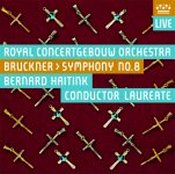Bruckner’s Eighth Symphony is the last orchestral piece the composer completed, and it is one of his strongest contributions to the genre. This Symphony lends itself well to memorable performances, among them the enduring recording by Herbert von Karajan that some regard as the finest yet recorded. (Karajan recorded Bruckner’s Eighth Symphony with the Vienna Philharmonic in November 1988, and it was released in 1989 by Deutsche Grammophon as CD 427611-2 [2-CD set]). Like Karajan, Haitink has captured both the intensity of Bruckner’s music and also its vigor. A vibrant, affirming work, Bruckner’s Eighth requires the masterful technique of a conductor who knows its style and performers who can respond to such leadership.
Bruckner completed his Eighth Symphony in 1887, and revised it in 1890 and 1892. The score was altered by various individuals, with the Haas edition, something regarded as a compromise, as the version many conductors in the twentieth century have chosen to perform. In contrast to those the conductors who prefer the Nowak edition (1955), Haitink previously recorded the Haas version, which is the score used for the new RCO recording.
From the outset, Haitink’s recent performance is compelling, with the veritable catalogue of motives with which Bruckner opens the first movement connected through both tempo and, at times, timbre. As the conclusion of a single sonority hangs in the air, the next follows, like the threads of narrative and characterization in the early part of a novel by Dickens. At the core of the movement is Haitink’s treatment of the strings, which resonate richly, to serve as a foil for the wind and brass timbres. Nowhere does the brass section overwhelm the balance with its intensity, but rather, the timpani, woodwinds, and other instruments are present in the complex sonorities that are integral to this movement. Thus, as Bruckner develops his ideas thematically and refines their timbre, Haitink conveys an organic unity to the movement.
The solid interpretation found in the first movement is consistently present in this live recording, and that is one of the attractions of this CD. At the same time, Haitink paces the performance to allow details to emerge clearly. If Haitink differs from other conductors in his approach to Bruckner, it is his more cantabile style with the various themes that sets him apart. This is evident in the Scherzo, which lacks the often punctuated– and sometimes percussive – chords in the brass. When comparing this performance of Haitink to Karajan’s Deutsche Grammophon recording, the differences are apparent. Karajan’s recording has, perhaps, more resonance in the concert hall because of the more aggressive style it contains.
Yet with the contrasting sections that comprise it, the Scherzo is demanding for any conductor, and Haitink’s conception of the movement not only prevents the music from seeming disjointed, but also creates an audible sense of the structure. It is in the details, like the crescendo of the timpani that leads to the final portion of the Scherzo, that Haitink shows his mastery of the score. The recurring brass chords with which the movement begins are also a point of arrival at the end of the Scherzo, where Haitink brings out that figure to create an apt conclusion to Bruckner’s structure.
In the Adagio, Haitink elicits a rich and warm tone from the strings at the beginning that serves as a solid foundation for the various parts of the orchestra that follow. This demonstrates the cohesive ensemble that is a tradition with the Concertgebouw and which sets this particular recording apart from others. Haitink lingers over some phrases, while he also uses silence to create space between others, and as a result, his interpretation of this movement has a well-defined shape. One feature of the movement is the way that Bruckner allowed a variety of textures to underscore the musical form, and that aspect of the Adagio emerges clearly in this performance. It is a thoughtful, mature interpretation, which is has much to recommend for its dramatic balance.
With the Finale, Haitink opens aggressively, to propel the movement forward, and when he shapes the more lyrical theme groups to evoke momentarily the lush quality he gave the Adagio. With such a lengthy final movement as this, pacing is crucial, and this is not lost on Haitink in this performance. Each structural element falls into place, like the elements of a sound drama, and the pauses that introduce silence into the score are effective foils for the full sounds in which Bruckner indulged. At the same time, solo passages and chamber-like sections resonate well in this performance that moves elegantly to its conclusion.
This is an excellent recording that captures well the Concertgebouw in a work that is often associated with it. Likewise, Haitink’s legacy is enriched by this recording, which shows him at the height of his interpretative powers. This CD captures the immediacy of the performances on which it is based and offers a fine addition to the discography of this late work of Bruckner. If anything could be improved, though, it would be the second disc, which contains the final movement only (approximately 25 minutes). With the Concertgebouw having control of its releases, the Orchestra could have included on the second CD some extra, perhaps a rehearsal or part of an historic performance to enhance this already fine recording. Nevertheless, those who enjoy Haitink’s previous recordings of Bruckner’s music, including the Eighth Symphony, will appreciate the performance; at the same time, those who may be less familiar with Haitink’s approach to Bruckner should find this to be an excellent starting point.
James L. Zychowicz
Madison, Wisconsin
